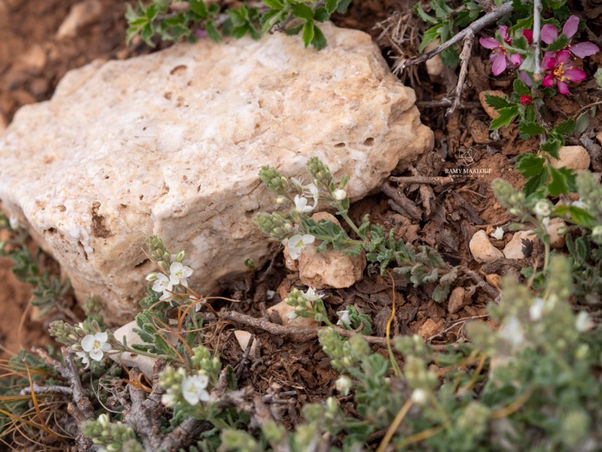Family |
Plantaginaceae
Veronica polifolia
Benth.
Leb. Syr. Tur. Jor.
Veronica polifolia Benth.
≡ Veronica orientalis Mill. var. polifolia (Benth.) Post
≡ Veronica macrostachya sensu Post & Dinsmore, non Vahl
(First published in A.P. de Candolle, Prodromus 10: 473, 1846; treated in Nouvelle Flore du Liban et de la Syrie, vol. 3, p. 247; 1983)
• Life-form & habit: Perennial with a strong taproot, 3–8 cm thick; stems prostrate to ascending, densely pubescent, 5–20 cm long, with woody, much-branched lower parts.
• Leaves: Sessile, 5–12 × 1–5 mm, linear-oblanceolate to spatulate, obtuse; lower leaves sometimes obovate. Margins revolute, strongly so in upper narrow leaves, slightly so in broader lower leaves; regularly crenate with 4–10 teeth (sometimes almost pinnatisect). Surfaces densely velvety-tomentose, grey-whitish above, grey-green beneath, rarely all greenish. Indumentum of fine, eglandular, spreading hairs (0.1–0.4 mm).
• Inflorescence & flowers: (1–)2–5 dense racemes, with 10–30 flowers, densely glandular-pubescent. Peduncles 5–15 mm. Bracts ovate to spatulate, obtuse. Fruiting pedicels 3–5 mm, about equal to or up to 2× as long as the bract. Calyx 2–3 mm, with 4(–5) oblong, obtuse, glandular-pubescent lobes. Corolla white with a rose-purple central ring, 5–8 mm across, exceeding the calyx.
• Fruits: Capsule 2–3 × 3–4.5 mm, about equalling or slightly longer than calyx, puberulent, glandular or eglandular, with shallow wide sinus, ± cuneate base. Style 2–3 mm. Seeds 2–6, c. 2 × 1 mm, ovate, convex, strongly rugose.
• Phenology: Flowers May–July.
• Habitat & elevation: Rocky screes and stony steppes, high mountains at 1400–2800 m.
• Lebanese distribution: Jabal Barouk (1800–1900 m), Jabal Kneissé, Jabal Sannine, Makmel.
• Native range: Lebanon–Syria, Palestine, Turkey (POWO).
⚠️ Taxonomic note: Mouterde distinguished this taxon from V. orientalis and V. macrostachya by its dense tomentum, revolute leaves, and small white flowers with a purplish eye. It represents a well-defined alpine species of the Veronica orientalis complex restricted to high Lebanese and Syrian mountains.



